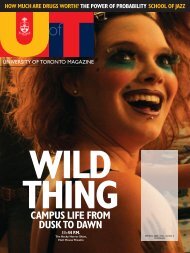The Next Big Idea 10 concepts that could - University of Toronto ...
The Next Big Idea 10 concepts that could - University of Toronto ...
The Next Big Idea 10 concepts that could - University of Toronto ...
You also want an ePaper? Increase the reach of your titles
YUMPU automatically turns print PDFs into web optimized ePapers that Google loves.
Leading Edge<br />
<strong>The</strong> <strong>Big</strong> <strong>Idea</strong><br />
How Cities Compare Urban<br />
centres have a huge impact on their<br />
residents’ well-being. So how can<br />
we make them better<br />
<strong>The</strong> year 2009 marked a watershed moment: for the first time in<br />
history, half the world’s population lived in cities. But while<br />
global urbanization is <strong>of</strong>ten associated with vast mega-cities<br />
such as Tokyo, Cairo and São Paolo, a majority <strong>of</strong> the world’s<br />
city-dwellers actually live in compact metropolitan areas with<br />
fewer than 500,000 residents.<br />
In developed nations, many cities now function as economic<br />
hothouses, bringing together high concentrations <strong>of</strong><br />
expertise, capital and entrepreneurs. A World Bank study in<br />
2006 noted <strong>that</strong> different-sized cities <strong>of</strong>ten specialize – in pharmaceuticals<br />
or post-secondary education, for example – or act<br />
as a transportation hub or financial centre. At the same time,<br />
growing urbanization in developing nations is exacerbating<br />
problems <strong>of</strong> poverty, congestion and pollution. Even wealthy<br />
cities increasingly suffer from a widening gap between the very<br />
rich and the very poor. <strong>The</strong> upshot is <strong>that</strong> local governments<br />
will become ever more crucial players in global affairs, perhaps<br />
even eclipsing their regional or national counterparts.<br />
With this ongoing shift, says Patricia McCarney, a development<br />
expert at the Munk School <strong>of</strong> Global Affairs, city <strong>of</strong>ficials<br />
worldwide are anxious to learn how their counterparts elsewhere<br />
deliver vital local services, from water treatment to transit,<br />
policing and garbage collection. By exchanging knowledge<br />
about best practices, she says, cities can improve their quality<br />
<strong>of</strong> life and attractiveness to international investors.<br />
It was this sort <strong>of</strong> thinking <strong>that</strong> led to the creation <strong>of</strong> the<br />
Global City Indicators Facility, a database <strong>of</strong> comparable statistics<br />
<strong>that</strong> allow cities to track their effectiveness on everything<br />
from planning and economic growth to transportation, safety<br />
and education. <strong>The</strong> project has the backing <strong>of</strong> the World Bank,<br />
whose <strong>of</strong>ficials have pushed for more reliable data to support<br />
its lending in heavily urbanized regions, such as Latin America.<br />
Two years after the launch <strong>of</strong> the Global City facility,<br />
McCarney’s team tracks more than <strong>10</strong>0 indicators and has<br />
signed up 125 cities <strong>of</strong> all sizes and from every part <strong>of</strong> the world,<br />
from Dallas to Kabul. McCarney – who travels extensively to<br />
promote the project – is aiming to reach the 1,000-city mark in<br />
time for Milan’s 2015 Expo on sustainable development.<br />
<strong>The</strong> project has posed all sorts <strong>of</strong> methodological challenges,<br />
not least <strong>of</strong> which is settling on a precise definition <strong>of</strong><br />
the term “city.” Metropolitan areas and urban agglomerations,<br />
especially those experiencing high growth, tend to spill over<br />
political boundaries. McCarney says her group chose to focus<br />
solely on municipal statistics <strong>that</strong> correspond to existing<br />
municipal boundaries. For large cities, they have formulated a<br />
way <strong>of</strong> aggregating data across a region to build indicators <strong>that</strong><br />
apply to sprawling urban areas, such as Greater <strong>Toronto</strong>.<br />
Each year, Global City publishes a statistical compendium,<br />
which is distributed to the members, as well as to the project’s<br />
funders. “Good, comparable data on cities didn’t exist until<br />
now,” says McCarney, patting the latest volume with a satisfied<br />
grin. “This is a first.”<br />
<strong>The</strong> index is a boon to international development agencies,<br />
urban researchers and businesses looking to set up new facilities.<br />
McCarney notes <strong>that</strong> some municipalities also use the data<br />
to counter much-hyped but less rigorous city rankings, which<br />
may provide misleading snapshots about what some cities have<br />
to <strong>of</strong>fer. But she observes her index’s most meaningful benefit<br />
is <strong>that</strong> it provides members with a forum to exchange ideas on<br />
how cities can function. “<strong>The</strong> exciting part is <strong>that</strong> the cities<br />
themselves have started to build a network,” she says, “and<br />
<strong>Toronto</strong> is now at the hub.” – John Lorinc<br />
illustration: nick higgins<br />
Lingo<br />
Sexsomnia<br />
People talk in their sleep and walk in their<br />
sleep – but have sex in their sleep Some<br />
do, according to Dr. Colin Shapiro. A study<br />
conducted at the Sleep Research Laboratory<br />
at the <strong>University</strong> Health Network’s <strong>Toronto</strong><br />
Western Hospital, where Shapiro is head <strong>of</strong><br />
neuropsychiatry, found <strong>that</strong> as many as one<br />
in 12 patients reported engaging in sexual<br />
activity while sleeping. <strong>The</strong> research found<br />
<strong>that</strong> the phenomenon was about three times<br />
more common in men as women. <strong>The</strong> term<br />
“sexsomnia” falls under the category <strong>of</strong> sleep<br />
disturbances known as parasomnias.<br />
winter 2011 21
















